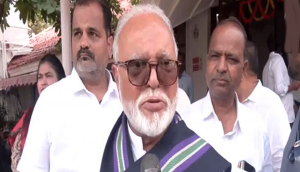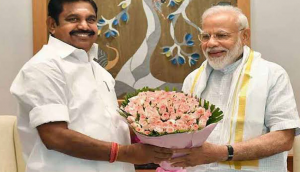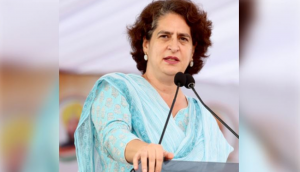Sorry, a parallel cannot be drawn between the feud in the SP & the one that happened in TDP

Uttar Pradesh Chief Minister Akhilesh Yadav and the Samajwadi Party patriarch Mulayam Singh Yadav will be battling it out as to who legitimately owns the rights over the party in front of the Election Commission of India (ECI) on 9 January. For political historians watching over this feud - two things will clearly give them a sense of déjà vu.
They are:
1. The tussle over the proprietary of the party leadership
2. The querulous issue of who should get the bicycle symbol.
These same two issues were fought over by the Telugu Desam Party's (TDP) patriarch NT Rama Rao, who founded the party, and his son-in-law and the current TDP supremo N Chandrababu Naidu, the Chief Minister of Andhra Pradesh. Incidentally, the TDP's election symbol is also a bicycle.
Fictitious narrative over the rumblings within the TDP, the magnified portrayal of dissent and the high-decibel campaign by media that partly sponsored the coup - led to Naidu's ascendancy. However, Akhilesh was enthroned by his dad Mulayam Singh Yadav who "gracefully" stayed aside soon after the elections in 2012.
Thus, one can hardly draw a parallel between the two parties and the scenarios that preceded and that unfolded during the rift between the helmsmen of both parties.
Different trajectories
The denouement of the Telugu Desam soap opera had an element of suspense before it became fully clear: NTR was ousted and Naidu took over.
The outcome of the war of supremacy in the Samajwadi Party is anybody's guess - with 221 out of 229 MLAs in the 404-member Assembly and 60-odd MLCs pledging support to Akhilesh Yadav.
With just these similarities, one cannot draw a parallel between the "infamous palace coup" of the TDP in which the legendary NTR was deposed from the chief minister's gaddi and also the presidency of the party.
Chandrababu Naidu had revolted against NTR. He had created a build-up before striking the patriarch out. He turned the most powerful media in his favour. He had created a narrative that it was the need of the hour to change the leadership in the TDP.
He had all the dozen-odd children of NTR on his side, for he knew that the bonding within the family, after the advent of NTR's second wife Lakshmi Paravathi into his life, was as strong as its weakest link.
After assuming office, Naidu had systematically undone everything, especially the mega welfare schemes, that was dear to NTR's heart. While the narrative had built up a case against NTR politically, Naidu did not mince words in asserting that "NTR lacked moral values" (in an interview to India Today Telugu edition) and that the TDP did not need NTR at all. He had the patriarch's family members going hammer and tongs against the old man.
And the rest is history.
Different circumstances
In the case of Akhilesh, he is already holding the reins of the government and is firmly in the saddle as the chief minister of India's largest state. He hasn't ever criticised his father, but continued to observe that Netaji was being ill-advised.
His grouse and anger is on his uncle. The rancour in the party, expulsions, revocation and retraction of the same in the SP have no parallel to what had happened in the TDP.
In the case of the TDP, there was no attempt at truce from either side. NTR was hooted and booed by the party workers, who did not hesitate to hurl footwear on the party founder in front of Hotel Vice-Roy when he had gone to persuade them to return home.
That's not the treatment being meted out to Mulayam Singh Yadav.
The goal of Naidu was clear: it was to usurp the chief ministership and the party presidency and emerge as unquestioned boss of the TDP. Akhilesh is already completing one full term as chief minister without being rattled.
Naidu won the 1999 Assembly polls, just because he aligned with the BJP which was very strong in the post-Kargil war scenario where Vajpayee was ousted with just one vote in Lok Sabha during a no-confidence motion.
Akhilesh cannot work hand in glove with Narendra Modi or Amit Shah to enter into a political truck with the BJP.
Chandrababu Naidu's advantage was that NTR had died by the time the first election had to be fought by him in 1996 (Lok Sabha polls) and there was none to oppose. Even then, the Congress fared better than the TDP.
Akshilesh Yadav's situation is just incomparable with that. He has formidable fighters in Modi, Mayawati and a host of others.
Thus, any comparison between the TDP and the SP is just a figment of fertile imagination of self-styled pundits.
Edited by Jhinuk Sen
First published: 7 January 2017, 6:24 IST





![BJP's Kapil Mishra recreates Shankar Mahadevan’s ‘Breathless’ song to highlight Delhi pollution [WATCH] BJP's Kapil Mishra recreates Shankar Mahadevan’s ‘Breathless’ song to highlight Delhi pollution [WATCH]](https://images.catchnews.com/upload/2022/11/03/kapil-mishra_240884_300x172.png)

![Anupam Kher shares pictures of his toned body on 67th birthday [MUST SEE] Anupam Kher shares pictures of his toned body on 67th birthday [MUST SEE]](https://images.catchnews.com/upload/2022/03/07/Anupam_kher_231145_300x172.jpg)






